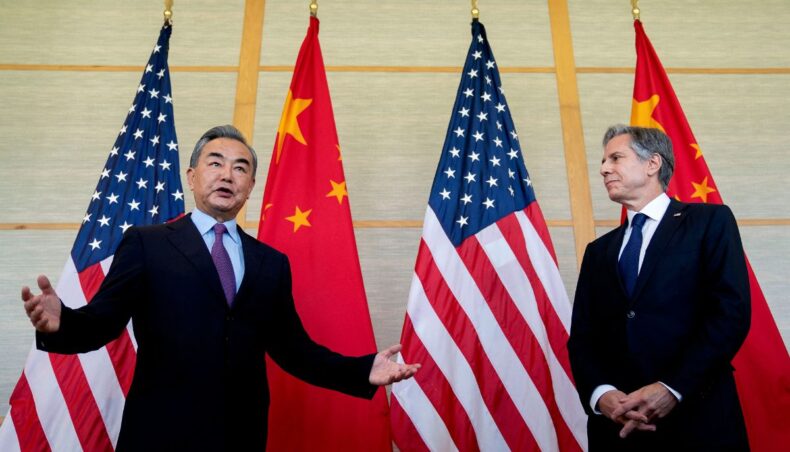According to reports, the US Secretary of State reminded Wang Yi, the foreign minister of China, that Beijing was not acting “neutrally” toward Ukraine and was assisting in the spread of “Russian propaganda.“
United States Secretary of State Antony Blinken claimed that he had spoken with Chinese Foreign Minister Wang Yi about Russia’s invasion of Ukraine and expressed worries regarding Beijing’s allegiance to Moscow.
After attending a summit of the G20 foreign ministers on the Indonesian island of Bali the day before, the two diplomats met in person on Saturday for five hours of “candid” discussions.
Despite the complexity of our connection, Blinken asserted, “Our delegates found today’s discussions to be fruitful, open, and helpful.”
We are concerned about the PRC’s alliance with Russia, which I reiterated to the state councilor, Blinken said.
Blinken claimed that he did not believe China was acting impartially since it had backed Russia in the UN and “amplified Russian propaganda.”
“The U.S.-China relationship has significant implications not only for our nations but also for the entire world. He pledged to maintain open lines of communication with Beijing in saying, “We are dedicated to managing this relationship, this competition, properly.
A US official claimed that “neither side held back” during the conversations after the meeting.
Despite the candor, the official said, “the discussion was also beneficial since the tone was extremely professional. We were quite honest about where our differences are.”
In a phone chat with President Vladimir Putin on June 13, Chinese President Xi Jinping made it plain, according to Blinken, that he stood by his choice to partner with Russia.
Beijing and Moscow pledged a “no limits” alliance just prior to Russia’s invasion of Ukraine on February 24; nevertheless, US officials said they have not observed China evading harsh sanctions imposed on Russia or giving it military hardware.
If China provides tangible support for the conflict, which Moscow describes as a “special military operation” to weaken the Ukrainian military, US officials have threatened penalties as well as other repercussions. According to Kyiv and its friends in the West, the invasion is an unprovoked territory grab.
Blinken also emphasized US worries about China’s “increasingly aggressive rhetoric and activity near Taiwan and the crucial imperative of maintaining peace and stability across the Taiwan Strait.”
He continued by saying that he had also brought up issues with respect to minorities in Tibet and the western region of Xinjiang.
‘Dialogue is constructive’
In a statement, China’s foreign ministry noted that both countries had broadly agreed to cooperate to strengthen their ties, but it also listed a long list of complaints against Washington, including that it had been “smearing and assaulting” China’s political system.
According to a statement from the ministry, Wang challenged several “erroneous US ideas” on Xinjiang, Hong Kong, and the South China Sea.
Wang also urged the US to immediately remove tariffs on imports from China, stop meddling in its domestic affairs, and refrain from endangering its interests in the name of democracy and human rights.
It went on to say that “both sides feel this dialogue is meaningful and productive, which will assist improve mutual understanding, lessen misunderstandings and misperceptions, and create the basis for future high-level encounters between the two nations.”
Prior to the meetings, US officials stated that the goal of the gathering was to maintain stable US-China relations and prevent them from unintentionally escalating into confrontation.
The United States has referred to China as its principal strategic adversary and has expressed fear that Beijing may attempt to annex the democratically self-governing island of Taiwan in the future.
The two biggest economies in the world continue to be important trading partners despite their competition. It is anticipated that the Biden administration would soon reduce some of Trump’s tariffs on Chinese imports. This would help to reduce the country’s surging inflation, which has turned into a significant political problem.
When questioned about his decision to forego a meeting with Sergey Lavrov, the foreign minister of Russia, at the G20, Blinken responded that Washington saw “no signs” of Moscow speaking with G20 officials about its invasion of Ukraine.
The previous day, as Western nations criticized Moscow for its invasion of Ukraine, Foreign Minister Lavrov stormed out of meetings with other G20 foreign ministers taking place in Indonesia.













